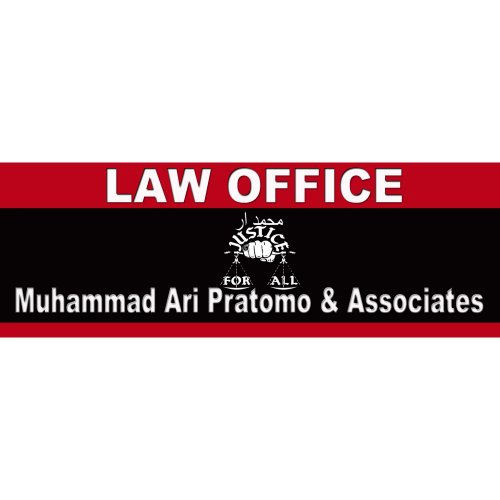Best Financial Services Regulation Lawyers in Bogor
Share your needs with us, get contacted by law firms.
Free. Takes 2 min.
List of the best lawyers in Bogor, Indonesia
About Financial Services Regulation Law in Bogor, Indonesia
Financial Services Regulation in Bogor, Indonesia, is governed by a complex framework designed to ensure the stability and integrity of financial systems. These regulations encompass a wide range of financial services, including banking, securities, insurance, and other financial institutions. The primary aim is to protect consumers and investors, maintain fair and efficient markets, and reduce systemic risk. Key legislation in this realm is developed and enforced by central Indonesian authorities such as the Otoritas Jasa Keuangan (OJK) or Financial Services Authority, and Bank Indonesia, the country's central bank.
Why You May Need a Lawyer
Individuals and businesses may require legal assistance in Financial Services Regulation for a variety of reasons. Common scenarios include navigating regulatory compliance, resolving disputes with financial institutions, ensuring proper licensing, challenging regulatory decisions, or responding to allegations of regulatory breaches. A lawyer can provide expert advice tailored to specific financial regulations applicable in Bogor and assist in dealing with complex financial service issues effectively.
Local Laws Overview
Bogor, like the rest of Indonesia, follows national laws concerning financial services regulation but does so with a local flavor. Significant aspects include compliance with Anti-Money Laundering (AML) obligations, adherence to consumer protection norms, and following guidelines on the conduct of financial institutions. The OJK plays a central role in oversight, ensuring that financial firms adhere to national standards, manage risk appropriately, and act in the best interest of their clients.
Frequently Asked Questions
1. What is the role of the OJK in Financial Services Regulation?
The OJK, or Financial Services Authority, regulates and supervises the financial service activities in Indonesia, ensuring that financial markets remain stable and that consumer rights are protected.
2. How can a resident of Bogor check if a financial institution is licensed?
Residents can verify the licenses of financial institutions through the official OJK website, which maintains an up-to-date list of entities authorized to operate within Indonesia.
3. What should I do if I suspect a financial institution of wrongdoing?
If you suspect misconduct by a financial institution, you should report it to the OJK immediately and consider consulting a lawyer to advise on the next steps.
4. Are there any specific consumer protection laws related to financial services in Bogor?
Yes, consumer protection laws in Indonesia include obligations for financial service providers to advertise transparently, ensure contract clarity, and handle customer complaints effectively.
5. What are the penalties for non-compliance with financial regulations?
Penalties for non-compliance can range from fines to revocation of licenses, depending on the severity of the breach. Criminal charges may also apply in cases of fraud or other serious violations.
6. Can a foreign bank operate in Bogor?
Yes, foreign banks can operate in Bogor provided they meet the licensing requirements set forth by the OJK and adhere to Indonesian financial regulations.
7. Is online banking regulated differently than traditional banking in Bogor?
Online and traditional banking services are both subject to the same overarching regulations, although online services must meet additional cybersecurity standards.
8. How does Indonesia's anti-money laundering law impact financial services in Bogor?
Financial institutions must implement stringent AML practices, including customer identification processes, reporting of suspicious transactions, and ongoing monitoring, to prevent illegal financial activities.
9. What measures are in place to protect investors in Bogor?
The OJK ensures implementing investor protection measures, including securities regulation, to foster a fair and transparent market environment.
10. Are there any tax implications to consider when dealing with financial services?
Yes, financial transactions and investments are subject to taxation laws, which may affect the net returns from financial activities in Bogor.
Additional Resources
For more information and assistance regarding Financial Services Regulation in Bogor, individuals can turn to the OJK, Bank Indonesia, and other financial sector associations. These bodies provide guidance, educational resources, and platforms for lodging complaints or inquiries. Furthermore, consulting with financial lawyers or advisors can provide a deeper understanding of specific situations.
Next Steps
If you need legal assistance regarding Financial Services Regulation in Bogor, consider the following steps: First, identify the specific legal issue you are facing. Next, seek referrals or search for legal practitioners specializing in financial services regulation. It's helpful to prepare a list of questions or concerns before your consultation to make the most of your time. Lastly, evaluate your legal options based on the advice you receive and take an informed decision to proceed with resolving your issue.
Lawzana helps you find the best lawyers and law firms in Bogor through a curated and pre-screened list of qualified legal professionals. Our platform offers rankings and detailed profiles of attorneys and law firms, allowing you to compare based on practice areas, including Financial Services Regulation, experience, and client feedback.
Each profile includes a description of the firm's areas of practice, client reviews, team members and partners, year of establishment, spoken languages, office locations, contact information, social media presence, and any published articles or resources. Most firms on our platform speak English and are experienced in both local and international legal matters.
Get a quote from top-rated law firms in Bogor, Indonesia — quickly, securely, and without unnecessary hassle.
Disclaimer:
The information provided on this page is for general informational purposes only and does not constitute legal advice. While we strive to ensure the accuracy and relevance of the content, legal information may change over time, and interpretations of the law can vary. You should always consult with a qualified legal professional for advice specific to your situation.
We disclaim all liability for actions taken or not taken based on the content of this page. If you believe any information is incorrect or outdated, please contact us, and we will review and update it where appropriate.








